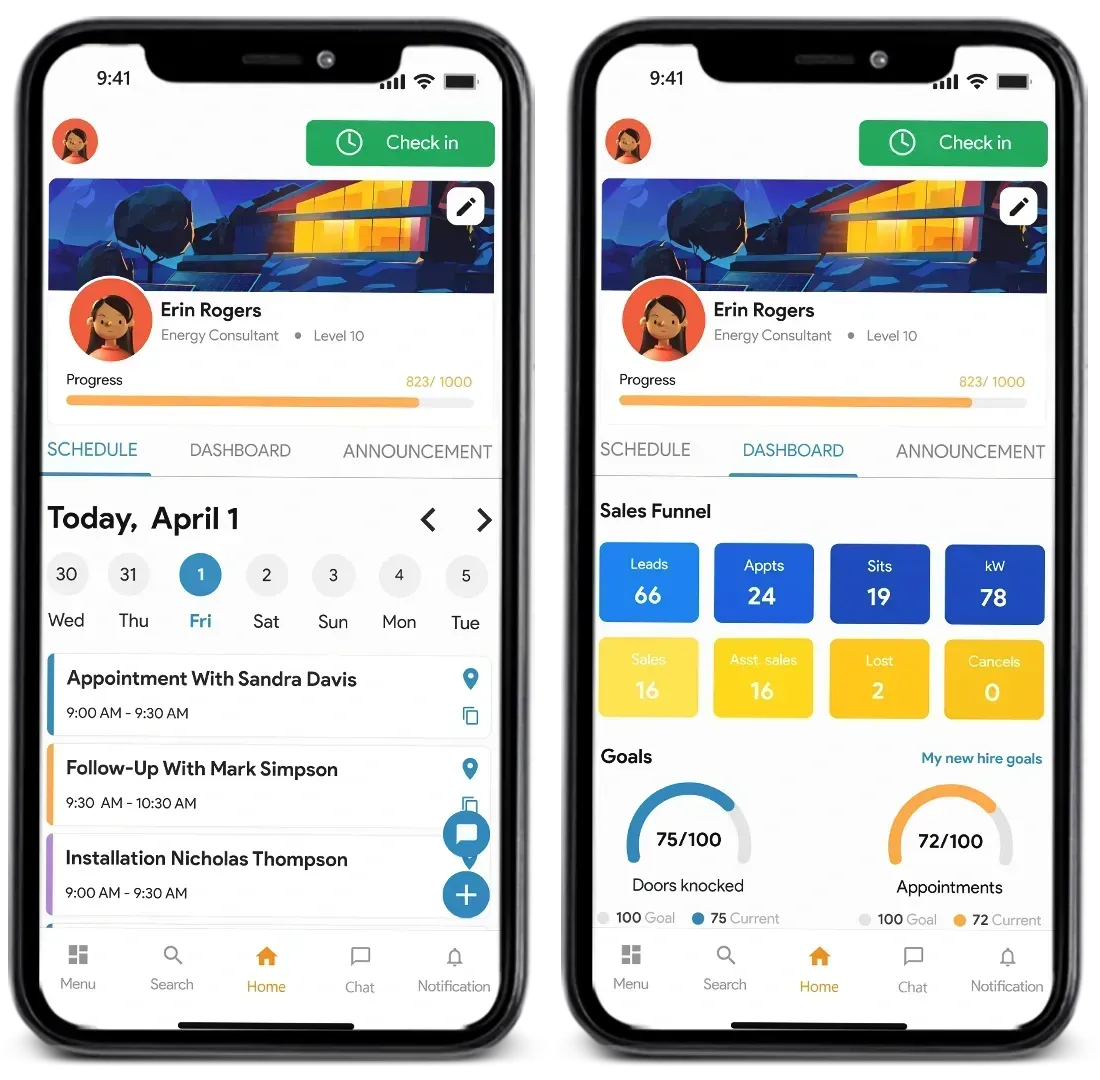October 3, 2024
Roofing CRM
“Customers may forget what you said, but they’ll never forget how you made them feel.” — Maya Angelou
In the roofing industry, this sentiment rings particularly true. For roofing contractors, building lasting relationships with clients is essential for success. With nearly 70% of successful sales stemming from solid lead management, the right tools can help capture and nurture those relationships effectively.
Enter the roofing CRM—a powerful ally in streamlining operations and enhancing customer satisfaction.
Our ultimate guide explores best practices for implementing roofing CRM software that will elevate your roofing business and position you for long-term success.
So, start scrolling!
Understanding Roofing CRM
A Roofing CRM (Customer Relationship Management) is a specialized software designed to help roofing contractors manage their customer interactions, sales processes, and business operations more efficiently.
It offers features tailored specifically for the roofing industry, allowing contractors to streamline tasks such as lead tracking, project management, job scheduling, customer communication, and invoicing.
Key Features of Roofing CRM:
1. Lead Management:
Tracks lead for the roofing companies from the first point of contact to conversion.
2. Job Tracking:
Monitors the progress of roofing projects, from initial inspection to completion.
3. Customer Communication:
Manages all interactions with clients, such as emails, calls, and text messages, in one place.
4. Proposals and Invoices:
Easily creates and sends professional quotes and invoices.
5. Automated Follow-Ups:
Sends automated reminders for upcoming appointments, deadlines, or follow-ups.
Simply put: Roofing CRMs are designed to simplify the daily tasks of running a roofing business, improve customer satisfaction, and boost overall efficiency. They help contractors focus on growing their business while automating routine operations.
Learn Why Your Roofing Business Needs a Roofing CRM.

Why Do Contractors Need a Roofing CRM?
A Roofing CRM is an important tool for contractors. It helps manage customer relationships, track projects, and organize daily tasks.
Let’s explore how it can improve your roofing business:
1. Organize Your Business
A Roofing CRM is specifically designed to organize everything in one place. From managing leads to tracking job progress, it keeps you organized.
It also helps you order materials quickly and easily. Using powerful tools like this will help you stay on top of tasks and grow your business.
2. Improve Customer Relationships
A Roofing CRM helps you manage every customer interaction. It keeps a record of all communication, making sure nothing is missed.
With this tool, your customers get better service, and that leads to more referrals.
3. Track Projects Better
With aerial measurements and project tracking features, you can see the status of every job in real-time.
The CRM also helps you order materials and assign tasks to your team. It reduces errors and keeps projects on schedule.
4. Automate Tasks
Automating repetitive tasks like follow-up emails saves time. This means fewer mistakes and less work for your team.
Powerful tools like these free up time for more important tasks:
5. Use Other Tools and Data
Roofing CRMs often integrate with other tools you already use. This makes it easier to get work done and see all the data in one place.
The CRM gives you access to general features like data tracking and analysis.
6. Easy Onboarding and Training
A specifically designed Roofing CRM usually comes with initial onboarding and simple training. This helps reduce training time for your team.
With fewer complications, the CRM becomes easier to use, and you get back to work faster.
Know 10 Powerful Ways a Roofing CRM Can Boost Your Business Growth.
Best Practices for Implementing a Roofing CRM: What Every Contractor Should Know
Implementing the best roofing software can be a game-changer for contractors, helping to streamline operations, enhance the customer experience, and grow your business.
With specialized platforms like Sunbase Roofing CRM, the sales teams can take advantage of tailored solutions to meet their specific needs.
Here’s how to implement a roofing CRM effectively-
1. Identify Business Needs
Before implementing roofing CRM platforms, it's important to assess what your business needs. Analyze your sales process and look for areas that need improvement.
Consider what challenges your sales reps, office staff, and field teams face daily. Are repetitive tasks slowing down your workflow? Do you need better tools to manage roofing jobs across multiple locations?
Assess Current Challenges:
What roadblocks are you facing in lead management, ordering materials, or tracking roofing jobs? Address these first.
Define Clear Goals:
Whether it’s improving your customer experience or speeding up the sales process, clearly defined goals will help guide your CRM implementation.
Involve Key Stakeholders:
Make sure your sales team and other employees who will be using the CRM are involved in the decision-making process to ensure their needs are met.
2. Choose the Right Roofing CRM
Not all CRM solutions are built equally. Instead of opting for a standard CRM, roofing contractors need one that is specifically designed for the industry.
Sunbase Roofing CRM is a powerful tool created to handle the unique needs of roofing companies.
Evaluate Roofing-Specific Software: Unlike a standard CRM, Sunbase offers specific features tailored for roofing, such as job photos, project tracking, and the ability to collect payments.
Key Features to Look For:
- Seamless management of roofing jobs at multiple locations.
- Lead management tools that help the sales team efficiently track new leads through the sales process.
- Integration with other tools like email marketing, invoicing, and more.
With Sunbase's all-in-one solution, contractors can automate many tasks and handle everything from material orders to job photos in one platform.
3. Ensure Proper Team Training
A CRM is only as good as the team using it. Training is key to making sure your staff knows how to use the system to its full potential.
Comprehensive Onboarding:
Train your sales reps, office staff, and others on how to best use the CRM to track new leads, follow up with clients, and manage roofing jobs.
Continuous Learning:
Regular updates and refresher training ensure your team continues to operate effectively and takes advantage of all the powerful tools your CRM offers.
Create Internal Resources:
Create guides or video tutorials for your team so they can quickly reference the specific features they need, like tracking material orders or automating follow-ups.
4. Customize the CRM to Your Workflow
Every roofing business operates differently, so it’s essential that your CRM adapts to your specific needs. Customization allows your business to maximize efficiency.
Tailor to Your Processes:
Adjust the CRM to fit your company's workflows, whether it’s managing roofing jobs, assigning tasks, or processing material orders. Sunbase allows for easy customization to fit your unique requirements.
Integrate with Other Tools:
Ensure that the CRM integrates with other systems, like email marketing platforms or accounting software, to create a smooth, connected workflow.
Automate Repetitive Tasks:
Use automation to save time. Set up workflows for follow-ups, status updates, and collecting payments to reduce manual work and minimize errors.
5. Regularly Analyze CRM Data
A roofing CRM like Sunbase offers valuable insights that can guide your decision-making. Regularly analyze data to track performance and identify areas for improvement.
Monitor Key Metrics:
Use reports to track sales process efficiency, lead conversions, project timelines, and overall business performance.
Use Data for Strategic Decisions:
Leverage CRM data to make informed decisions, whether it’s improving customer service, optimizing the sales process, or better managing multiple locations.
Regular Reviews:
Ensure that your CRM continues to deliver value by conducting regular reviews of its performance and making adjustments as needed.
Why Choose Sunbase Roofing CRM?

Sunbase Roofing CRM offers an all-in-one solution designed specifically for roofing contractors. Unlike a standard CRM, Sunbase provides specialized tools that cater to the roofing industry’s needs.
Streamlined Lead Management:
Capture, track, and convert leads efficiently to boost sales.
Optimized Project Tracking:
Keep every project on schedule with advanced tracking features, from job photos to material orders.
Enhanced Customer Communications:
Maintain seamless communication with customers and improve the customer experience by automating follow-ups and updates.
Automation and Efficiency:
Save time by automating repetitive tasks like follow-up emails and payment collections.
Powerful Tools for Your Business:
Whether managing roofing jobs across multiple locations, tracking new leads, or automating invoicing, Sunbase’s robust platform helps you operate effectively.
Sunbase not only simplifies roofing software needs but also integrates smoothly with other business tools, ensuring that contractors have everything they need to run their business smoothly.
With a user-friendly interface, advanced features, and customizable workflows, Sunbase is the ultimate choice for roofing contractors looking to grow their business and streamline their operations.
Conclusion: The Path to Success with the Best Roofing CRM
Implementing a roofing CRM is not just about choosing software; it’s about transforming your business. With the right roofing CRM features, you can enhance business management, improve customer relationships, and drive your roofing company toward greater success.
When you follow these approaches, your roofing business will be well-equipped to tackle the challenges of the industry and seize new opportunities.
Whether you’re a seasoned pro or just starting out, embracing a best roofing CRM can set you on the path to efficiency and growth.
Get in Touch with Sunbase:
Ready to elevate your operations? Discover how Sunbase Roofing CRM can empower your team to work smarter, manage projects effectively, and create lasting customer relationships.
Request a demo today and transform your roofing business!
FAQs:
Q1. How does a CRM improve project management?
Ans - Roofing CRM platforms centralize communication, track job photos, and manage tasks across multiple locations.
Q2. Can a CRM help with payments and ordering materials?
Ans - Yes, CRMs simplify collecting payments and managing material orders, keeping projects organized and on time.
Q3. What features should roofing contractors look for?
Ans -Contractors should seek specific features like lead tracking, email marketing, and project management tools to operate effectively.
Q4. How do roofing CRMs support sales teams?
Ans -Roofing CRMs streamline lead management, assign new leads to sales reps, and automate follow-ups to close more deals.
I agree to receive marketing messaging from Sunbase at the phone number provided above. I understand data rates will apply, and can reply STOP to OPT OUT.







